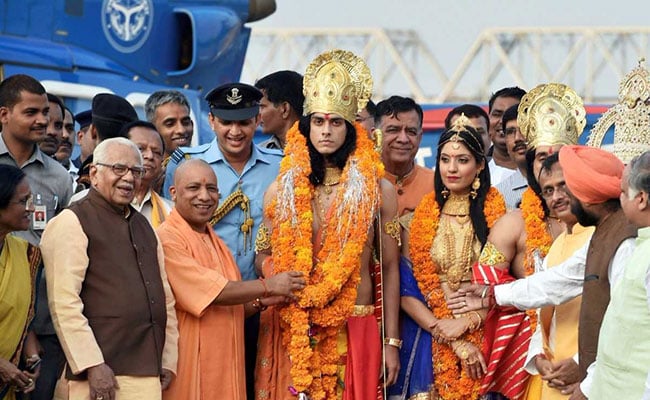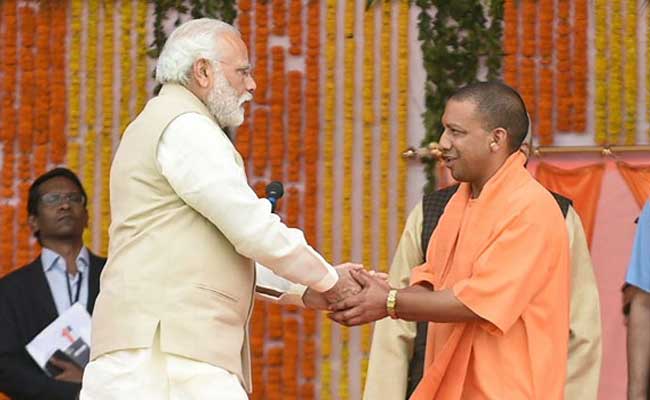At an election rally in Madhya Pradesh, Uttar Pradesh Chief Minister Yogi Adityanath mocked the Congress party saying "Kamal Nath-ji, aap ko yeh Ali mubarak, hamare liye Bajrangbali paryaapt honge (You hold on to Ali, Bajrangbali is enough for us). The comment was followed by a rallying of RSS and VHP members in Ayodhya to build a momentum for Ram Temple.
Yogi Adityanath, who has been the most polarizing figure in the BJP, had yielded rich dividends for his party in Uttar Pradesh. The star campaigner held a record 74 rallies across four states for these assembly elections, more than Prime Minister Modi and his lieutenant Amit Shah. At each rally, the language was coarse and divisive, stoking hatred, invoking Ram Rajya.

Uttar Pradesh Chief Minister Yogi Adityanath during Diwali celebrations at Ayodhya
The Prime Minister himself appeared to speak a language no different from Adityanath. "Congress has come up with a fatwa that I should not begin my election rallies with Bharat Mata Ki Jai' said the Prime Minister at a rally in Rajasthan.
As the leads from the states started trickling in yesterday, some news channels suggested that the BJP was trailing in constituencies that witnessed a rally by Yogi Adityanath. Whether or not that stands corroborated, the fact is that the Yogi did not come through on what he was propped up to pronounce.
The Congress swept Chhattisgarh where the campaign narrative revolved around the concocted theme of Urban Naxals and hyperbole around a flawed idea of nationalism. The Congress secured a comfortable victory in Rajasthan that witnessed the silence of the state through lynchings in the name of alleged beef consumption. In Madhya Pradesh, where the Shivraj Singh Chouhan-led BJP fielded just one Muslim candidate, the Congress is likely to claim another victory.

Yogi Adityanath, a firebrand leader with markedly right-wing views, was employed as a star campaigner in the run-up to the assembly elections
It would be naïve to believe that stoking hatred in India has been ineffective. The 2014 general elections in Uttar Pradesh held after the communal riots in Muzzaffarnagar saw the BJP secure its best-ever tally for the party in the North Indian bastion. It established Yogi Adityanath as a politician who could rival the Prime Minister as a mascot of Hindutva. But yesterday has proved that the BJP has miscalculated the mood of the nation by assuming it could distract the country from shortcomings of governance with a singular narrative of hate. In an astute column written for The Print ahead of the results, senior journalist Shekhar Gupta wrote, "Even if it paid rich dividends in Uttar Pradesh elections soon after, Modi erred in gifting away that incredible success to Yogi Adityanath who no one had voted for. Demonetisation broke his government's economic momentum. Yogi Adityanath may wreck his immediate political future."

For Rahul Gandhi and the Congress, it was one of the best poll counting days since 2014
Within hours of the result, the BJP Rajya Sabha MP Sanjay Kakade told a news agency that the party was paying the price for focusing on the Ram Temple and renaming cities instead of the promised development model. Kakade echoed the sentiment of many BJP leaders who in the past couple of weeks have spoken in loud whispers the over-dependence on Adityanath and the fringe which was given a free reign on the streets and on national television. A BJP leader told this journalist, "Hindu-Muslim kaam toh karta hai, lekin mandir se kab tak logon ka pet bharega? Ye na bhoolein ki Vajpayee ko bhi Babri ke baad rajneta ka chola odhna pada tha' (The Hindu-Muslim polarization works but how long can an aspirational temple feed empty stomachs? Let's not forget Vajpayee too had to play a statesman after the Babri demolition)."

In the semi-final to the Lok Sabha 2019 polls, yesterday's results are clearly a setback for the BJP
Modi's huge victory in 2014 was based on his stated commitment to progress and development - ''Achhe din" and the idealistic ''sab ka saath sab ka vikas''. Having followed Modi closely in Gujarat and also having worked in the state for many of my investigative pieces, I had always sensed a man cleverly managing the perceptions around him with a great deal of meticulously-planned events like 'Vibrant Gujarat' that created an image of a man enabling the developmental agenda. The hate that was witnessed in Gujarat was cleverly cloaked in the Gujarat model of development.
But after assuming power in 2014, Modi has outsourced the responsibility of building the narrative of the BJP to rabble-rousers like Yogi Adityanath, Giriraj Singh, Sakshi Maharaj. The initial oratory around development, farm distress and black money was replaced by a narrative on beef ban, Mughals, minority appeasement and delegitimizing of liberal voices. With this lack of focus, It has been least surprising that some of the most important institutions in the country like the RBI and prominent universities have been discredited in the eyes of the public.

Congress president Rahul Gandhi offering prayers at Mahakaleshwar Temple in Ujjain
If the elections today have been a reality check for the BJP, the results also have learnings for the Congress party whose leaders have been on a temple run preceding the elections with Kamal Nath and Rahul Gandhi turning Shiv bhakts. But the Congress victory in the states of Chhattisgarh, Rajasthan and Madhya Pradesh has largely been a result of a disenchantment on the ground and the party's ability to lead the conversation towards the alleged corruption in the Rafale deal, the destruction of institutions like the CBI and the RBI.
While the elections today may have paused the Adityanath juggernaut, party members believe that it is early to expect the BJP to speak the language of inclusion leading up to 2019. Some suggest that the BJP could take a more strident approach to hate politics in the hope of polarizing votes in the Hindi heartland. Modi is cornered by the circumstances that he has created for himself through the deliberate destruction of institutions and allowing hate to manifest. Much strategizing must be afoot.
(Rana Ayyub is an award-winning investigative journalist and political writer.)
Disclaimer: The opinions expressed within this article are the personal opinions of the author. The facts and opinions appearing in the article do not reflect the views of NDTV and NDTV does not assume any responsibility or liability for the same.


